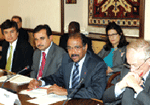
62nd-World-Health-Assembly
International labour migration, or the movement of people across national borders for employment, is a growing phenomenon and an increasingly important aspect of global, regional and national economies. However, HIV has become a key issue of concern with cross border and overseas migration.
Representatives of Pakistan, China, Thailand, Afghanistan, Bangladesh and Nepal together with senior officials from ILO, IOM, WHO and UNAIDS participated in a meeting on the issue during the 2009 62nd World Health Assembly. The meeting
was a follow up on the one held in Geneva during the 60th World Health Assembly in 2007. Initiated by the government of Pakistan, this year’s meeting highlighted
the need to engage in inter regional dialogue between sending and receiving countries, especially countries under the Gulf Cooperation Council (GCC). It is to find ways to reduce the risks and vulnerabilities to HIV that migrant workers face.
Governments from Asian countries have raised their concerns regarding the large number of migrants in the region. At any given point in time, there are an estimated 58 million people on the move outside of their home countries within Asia and beyond. Outside Asia, the countries of the GCC region are the primary destination for a majority of migrant workers from the Philippines, Bangladesh, Sri Lanka and Pakistan.
The meeting provided a platform for Ministries of Health of sending countries
in South and South East Asia to share experience on issues common to pre-paring workers for work outside the country especially in terms of reducing vulnerability to HIV and other health risks. The delegates also discussed how regional mechanisms, such as the Colombo process and the Abu Dhabi Dialogue, and international commit-ments could be harnessed to support dialogues and cooperation between sending and receiving countries as well as steps to developing a joint position/strategy to support negotiations and collaboration with receiving countries.
The meeting’s main objectives included:
• To identify a strategy for inter sectoral collaboration between Ministry of Health and Ministry of Labour to address HIV vulnerability among migrant workers in the Asian region
• To set up a Task Force to ensure a course of action and progress review. One of the immediate actions would be to map which countries are implementing HIV prevention programmes for migrant workers, including pre-departure and post-arrival orientation, and identify gaps and potential partners/ resources
• To involve UN and other organizations committed to the issue at country and regional level in both sending and receiving countries
• To involve non-govern-mental organizations working with/for migrants as
key partners to monitor development of migrant issues in countries in the region
UNAIDS Executive Director Michel Sidibé also participated in the meeting whose outcomes will be considered in the upcoming UNAIDS board meeting
which will discuss the issue of forced displacement and migrant populations in relation to HIV and the challenges of assuring such populations universal access to HIV prevention, treatment, care and support.
Sidibe highlighted the need for evidence-based strategies focusing on the needs of migrant populations. He also underlined the importance of political leadership for an effective response to AIDS that will involve all sectors of society.
Challenging process to work abroad Although migration has become a part of the economic functioning of many countries – both sending and receiving – migrants are often not perceived as individuals with rights. They can be exploited, marginalized
and stigmatized throughout the migration process. Studies show that mobile populations are vulnerable to discrimination, exploitation and harassment at home and abroad. Their basic rights could be violated in terms of pay and working conditions. Migrants have often little or no right to legal or social protection and generally lack access to HIV services and information.
In recent years, an increasing number of migrant workers from Asia have been diagnosed with HIV in various countries in the Arab States. Deportations due to HIV status have resulted in severe economic loss for migrant workers and their families, who have been declared by authorities as “unfit” to work abroad.
As part of the visa process in some countries, migrants must undergo a health test including HIV from a certified clinic. In most cases, the migrant is referred to a specific clinic that is approved by the receiving country.
For example, all migrants going to a country in the GCC must attend clinics authorized by GCC Approved Medical Centers Association. They are expensive and mostly located in capital cities, adding extra costs such as transportation and lodging.
There is little or no referral to treatment or support services for those who do have a health condition, including those who test positive for HIV. If found HIV positive, most countries in the region will deport a migrant worker without explanation, with little compensation, and no consideration for the migrant’s rights or dignity.
